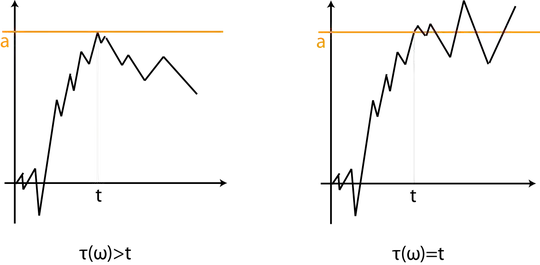Let $(B_t)$ be a standard Brownian motion and $\mathcal F_t$ the associated canonical filtration. It's a standard result that the hitting time for a closed set is a stopping time for $\mathcal F_t$ and the hitting time for an open set is a stopping time for $\mathcal F_{t+}$.
Is there an elementary way to see that the hitting time for an open set is not in general a stopping time for $\mathcal F_t$? Say the hitting time for an open interval $(a,b)$?
I'm interested in this question because it would show the filtration generated by a right-continuous process need not be right-continuous. There are other counterexamples for this on M.SE but they're all somewhat artificial.
My apologies if this is obvious. I just started learning about such things.
